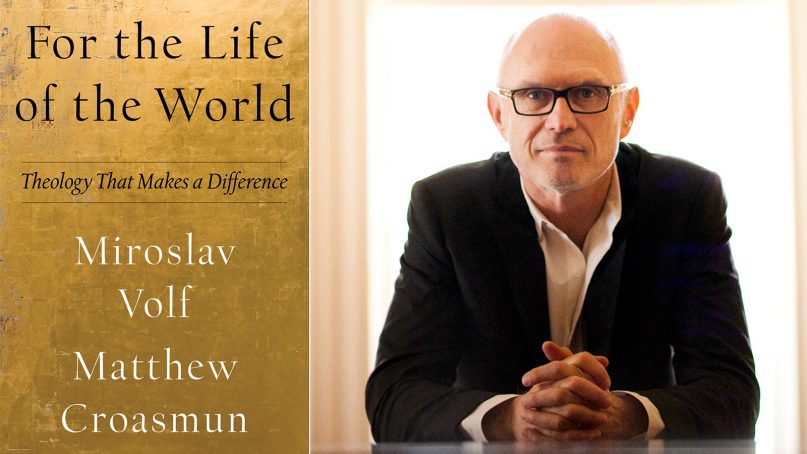(RNS) — Miroslav Volf, founder of the Yale Center for Faith and Culture, is a distinguished theologian with more than a dozen books to his credit. His colleague Matthew Croasman, director of the center’s Life Worth Living Program, is a pastor, a musician and a teacher of New Testament. Coming at theology at different places in their careers and from different viewpoints, they nonetheless begin in their book, “For the Life of the World,” published last month, with the same question: What makes for a flourishing human life?
It’s this question that the two theologians believe their discipline has failed not only to answer but to ask at a time when ordinary Christians are facing, in concrete ways, the prospect of diminished life. “For the Life of the World” is an exhortation to reorient theology toward this central question, as they explain in the following adapted excerpt.
Humanity today faces many challenges: the risks of an unprecedented pace of technological development; seemingly irreversible ecological degradation; immense discrepancies in wealth, knowledge, and power among individuals and the peoples of the world; an inability to live in peace given our manifold differences; and more. As we write this, the symbolic Doomsday Clock of the Bulletin of the Atomic Scientists is set on two minutes before midnight.
But the first step toward ecological, economic, and political health is conversion — reaffirmation or rediscovery of our human purpose and setting ourselves on a journey toward it.
Even if it were true, as dystopian literature and some scientific predictions suggest, that humanity is entering a valley of dry bones of our own making — desolate landscapes, cities in ruin, people at war over basic resources — we will be able to live with dignity in that valley, only if we know who we are and what our purpose is. And we’ll need that same knowledge inscribed into the very character of our souls in order to get out of that valley.
As an intellectual endeavor, theology matters because it is about what matters the most for human life. Theology worth its name is about what we ought to desire above all things for ourselves and for the world, about what we should desire in all the things that we desire (whether our desire is effective economic systems and just political orders, livable cities and deep friendships, possessions or lack thereof, healthy bodies and joyous progeny).
Theology matters because it is about the true life of the world.
We call those of us who see ourselves as theologians — academic theologians, church theologians, lay theologians, accidental theologians, any kind of theologian — to dare to believe that “God’s home” is the ultimate goal of human striving and the ultimate object of human rejoicing and therefore to make God’s home and the world’s journey to it the main focus of our most rigorous thinking and honest truth-seeking.
Christian theology has lost its way because it has neglected its purpose. We believe the purpose of theology is to discern, articulate, and commend visions of flourishing life in light of God’s self-revelation in Jesus Christ.
The flourishing of human beings and all God’s creatures in the presence of God is God’s foremost concern for creation, and should therefore be the central purpose of theology. With this manifesto we aim to return theology to itself so it can better serve communities of Christian conviction and participate in truth-seeking cultural conversation about flourishing life for all.
By “flourishing life” we mean the good toward which humans are meant to strive. It names not so much any number of things we desire, but the ultimate goal of our striving along with the values that determine what is truly worth desiring.
Sometimes visions of flourishing are like vivid images we are able to see and describe, but more often they are like a lens through which we see everything — the tacit “background” against which we live our lives, as Charles Taylor puts it. If they are only implicit, we need to tease them out, make them explicit.
In either case, it is our human responsibility to reflect on their function, origin, content, and existential or intellectual adequacy because they define our world and our very selves. We can switch from one vision to another, but if we do so in reality and not just in imagination, we become a “new person”: we come to experience ourselves and our world in a different way, and our lives take a new turn.
When our theology does not provide us with a compelling alternative vision of the good life, it betrays its purpose.
This is the tragedy of academic theology today: at the moment when theology’s tools are most needed to answer the most pressing question of our lives and to serve the common good, they are found stacked in a corner, dusty and neglected — even or especially by those charged with keeping them sharp. Theology is in crisis, largely because it has lost its nerve and forgotten its purpose to help discern, articulate, and commend compelling visions of flourishing life in light of God’s self-revelation in Jesus Christ.
(Excerpted from “For the Life of the World” by Miroslav Volf and Matthew Croasmun, ©2019. Used by permission of Baker Publishing.)





